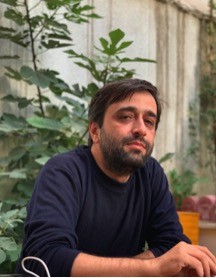Mohammad Memarian in the Los Angeles Review of Books:
 On Friday, March 20, I called my father to congratulate him on the Persian New Year. It felt gloomy, to put it mildly. We used to do it in person, shaking hands, hugging, and the three traditional kisses on the cheeks. As we are in self-quarantine, 300 miles away from each other, he acquired his very first smartphone just a week ago, rapidly catching up with technology to keep in touch with me. I watched him as he tried to turn on the selfie camera. He kept the phone so close that I could only see him with difficulty. But I could observe parts of him that usually go unnoticed: details of the wrinkles on his face, the tears he was struggling to hold back, a bruise on his left cheek, speckles I hadn’t seen before. We talked for a while, five minutes maybe, the longest routine call we had in years, and then we retreated into solitude, each into his own. The whole episode reminded me of stories of families torn apart by immigration. We are now torn apart by another, equally invisible force.
On Friday, March 20, I called my father to congratulate him on the Persian New Year. It felt gloomy, to put it mildly. We used to do it in person, shaking hands, hugging, and the three traditional kisses on the cheeks. As we are in self-quarantine, 300 miles away from each other, he acquired his very first smartphone just a week ago, rapidly catching up with technology to keep in touch with me. I watched him as he tried to turn on the selfie camera. He kept the phone so close that I could only see him with difficulty. But I could observe parts of him that usually go unnoticed: details of the wrinkles on his face, the tears he was struggling to hold back, a bruise on his left cheek, speckles I hadn’t seen before. We talked for a while, five minutes maybe, the longest routine call we had in years, and then we retreated into solitude, each into his own. The whole episode reminded me of stories of families torn apart by immigration. We are now torn apart by another, equally invisible force.
This invisible force, otherwise known as COVID-19, intruded into our lives in pretty much the same way it did into the lives of countless other people elsewhere. Except, perhaps, the context. For us Iranians, the disease came as the culmination of a long streak of unfortunate events, which inflicted upon many here a deep sense of helplessness.
More here.
